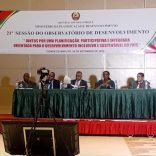Mozambique: Banks lower benchmark rate to 17.4% in July
Mozambique: Fisheries minister visits Maputo fishing port – AIM report

File photo: Facebook / Maria Pemba
The Minister of the Sea, Inland Waters and Fisheries, Augusta Maita, on Monday challenged the laboratory of the National Fisheries Produce Inspection Institute (INIP) to increase the levels of quality in its certification of Mozambican products.
She was speaking during a visit to various institutions supervised by her Ministry, including the INIP laboratory and the Maputo fishing port.
“We have a laboratory with a certification capacity which allows us to judge the quality of our fisheries produce on a footing of equality with any international laboratory”, she said, expressing satisfaction at the work undertaken by the team running the laboratory.
In the fishing port, Maita warned, the main challenge is silting, because the quays have not been dredged for a long time.
“Unfortunately dredging has not been done with the desired regularity, because of the costs”, she said. “It’s been four years since there was any dredging in the fishing port, but it should be done annually, or twice a year. This is one of the matters we must take as a priority”.
The ice-making factory in the port could once produce 20 tonnes of ice, but its capacity has now fallen to 14 tonnes.
Maita watched semi-industrial fishing boats load ice, and remarked “if one vessel alone loads six tonnes of ice, clearly the challenge is to increase ice-making capacity”. This is the responsibility, not of the government, but of the private sector.
Asked about the fishery closed season, when there is a ban on fishing certain species for the first three months of the year, Maita stressed that this measure is not intended to damage the interests of anybody.
There have been complaints about the closed season, and some fishermen have been caught violating the closed season rules. Maita explained that the purpose was to preserve fish stocks and allow them to recover.
“Some fisheries are already overfished, and, as a government, we have a responsibility for these resources”, she said.
The closed season, she explained, “is intended to ensure that our resources have the time to grow, to reproduce and to develop, so that, when our fishing boats put to sea, they will find products that can be competitive on the market”.
Anyone who visits the fishing port will see a fleet of 24 fishing boats lying uselessly at anchor. This is a monument to the greatest financial scandal that ever hit independent Mozambique – the loans of over two billion dollars granted by the banks Credit Suisse and VTB of Russia to the fraudulent companies Proindicus, Ematum (Mozambican Tuna Company) and MAM (Mozambique Asset Management).
The largest loan (850 million dollars) went to Ematum, but the independent auditing company Kroll could not account for 500 million dollars of this money. The banks sent the money, not to Mozambique but to the sole contractor for the three companies, the Abu Dhabi based Privinvest group. The Kroll audit report states that Privinvest overcharged Mozambique for the fishing boats and other assets by more than 700 million dollars.
Asked about the future of Ematum, Maita said “in due course we shall broach this subject with the bodies responsible for managing it”.
The proposal to hand the boats over to a new company, Tunamar, 51 per cent owned by Ematum, and 49 per cent by the Frontier Services Group (FSG), set up by the controversial American businessman, Eric Prince, seems to have come to nothing.
The man who was negotiating this deal, Ematum chairperson Antonio do Rosario, is currently under detention, awaiting trial for his part in the “hidden loans” scandal.












Leave a Reply
Be the First to Comment!
You must be logged in to post a comment.
You must be logged in to post a comment.